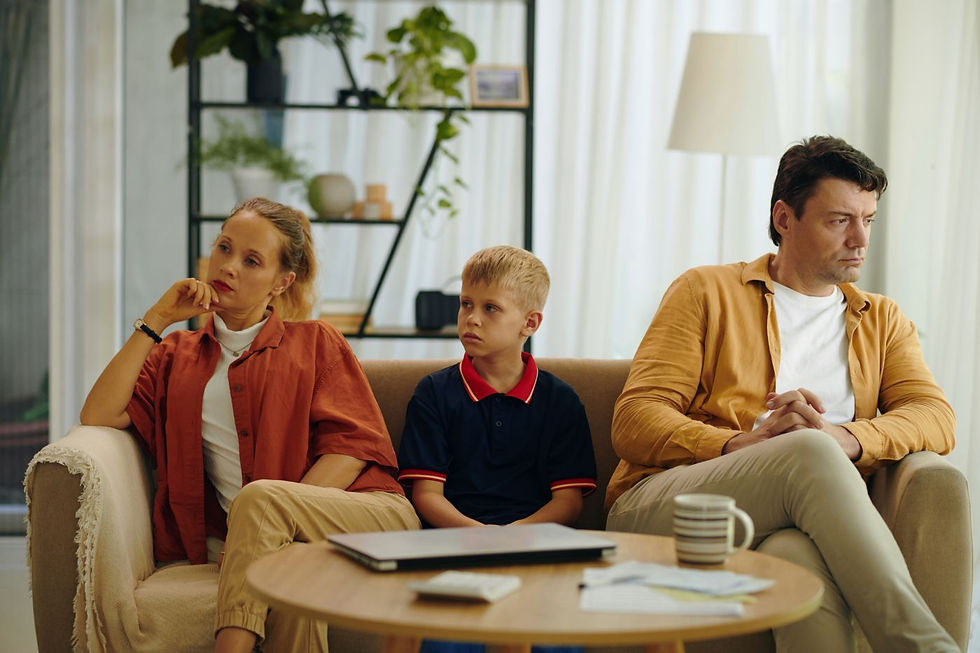How do I tell my child we are getting a divorce?
- Paulina Latifpour
- Jan 28, 2025
- 4 min read
Updated: Sep 4, 2025

Breaking the news of a divorce can be one of the most emotionally challenging conversations a parent can have with their child. It’s natural to feel stress and confusion when preparing for a conversation like this, but with the right planning, empathy and psychological strategies, you can minimize confusion and help your child feel secure despite the changes.
Prior to your discussion, it's essential to plan out how the conversation will go. If possible, both parents should be present, presenting a united front, reassuring the child that both parents are committed to their well-being. Parents should take time to plan main points, such as why the divorce is happening, while ensuring everything is age appropriate. The information shared with the child will vary depending on their age, but it’s important to discuss how this will affect their day-to-day life, without pressing blame or sharing marital conflict. Discussing specific detail should be avoided as it confuses the child and can cause an unnecessary burden on the child.
The setting also plays an important role in this process as it can set the mood for the conversation. It’s vital to choose a calm moment where the child is focused on the parents, with minimal distractions. Avoid having the conversation before activities like sports, school or bedtime, so that the conversation can run as long as it needs to, allowing the child to take time to process the new information and feel comfortable. A quiet space at home is the most ideal location, as it’s a familiar spot for the child, allowing them to fully process without any added stress.
When it comes to the actual discussions, stay age appropriate, recognizing how much information is necessary for each age group. For younger children stick with the concrete facts. For example, you might say, “Mom and Dad have decided to live in different homes because we think it’s the best choice for our family”. Avoid unnecessary details that will further confuse the child, instead focus on main changes that will happen in the child’s life. Older children may ask for more specific questions, they also might express strong emotions towards the sudden change. It’s important to be honest with your child, but spare details that involve the personal aspects of the marriage. Don’t share information that puts blame on either parent, this will only cause confusion and heightened emotions for the child.Continue to acknowledge your child’s feeling, no matter what they are, while reassuring them about what will stay the same, such as the love you have for them and your shared commitment to their care, or for younger children who will do school pick up,
tuck them into bed and make their meals. Your children will look to you for reassurance that their dailying grown -up care- taking duties stay in place.
One of the most common fears children have during a divorce, is that they are somehow to blame. Because of this, it’s essential to emphasize that the divorce is not their fault. Share that it’s a decision made between the two adults: “This is something between Mom and Dad, it’s not because of anything you did or didn’t do”. Along with this, emphasize stability and love for your child. When a big change like a divorce happens in a family it’s helpful for the child to feel as much stability as they can. Provide as much concrete information as possible about their daily routine and living arrangements. Not only is it important to share the adjustments of their everyday lives, but also maintaining the same routine. During a divorce, children feel a lot of uncertainty through all the change, and it’s important they feel some kind of consistency. Remind them of things that will stay the same, like their school, friends and extracurricular activities. Most importantly remind them your love for them hasn’t changed. Statements like, “we both love you very much and that will never change” can go a long way in the child’s feeling of security.
After you share the news, give your child time to process this information. As you allow them to take the time to sit with the news, encourage them to ask any questions or concerns they may have, reassuring them that they are allowed to have questions. Be patient with them, while validating any emotions they may be expressing. Whether they are feeling sadness, anger, confusion or even relief, telling them it’s okay to feel the way they do, or reminding them you’re here to listen, is validating and comforting for a child to hear. Some children may not react immediately, and that’s okay too! Your job as a parent is to let them know you're always there to talk or answer questions, even if that means conversation at later dates when they feel ready to talk.
While a divorce is an undoubtedly difficult and large change, it can also be an opportunity to model resilience and healthy coping. Let your child know that while things are changing, your family will work towards creating a new normal. In the end, breaking the news of a divorce isn’t easy, but it’s an opportunity to show them that love, and stability can still exist even if it looks different than it used to. With honesty, patience and a clear focus on their emotional needs, you can help your child take the news as best as they can as they face a new chapter in their life. This conversation isn’t about having the perfect script, quite frankly there isn’t one. It’s about being there for your children the best you can, making it known that you love them, care for them and will always be there for them. Letting your child know that they will get through this, not by themselves, but as a family.




Comments